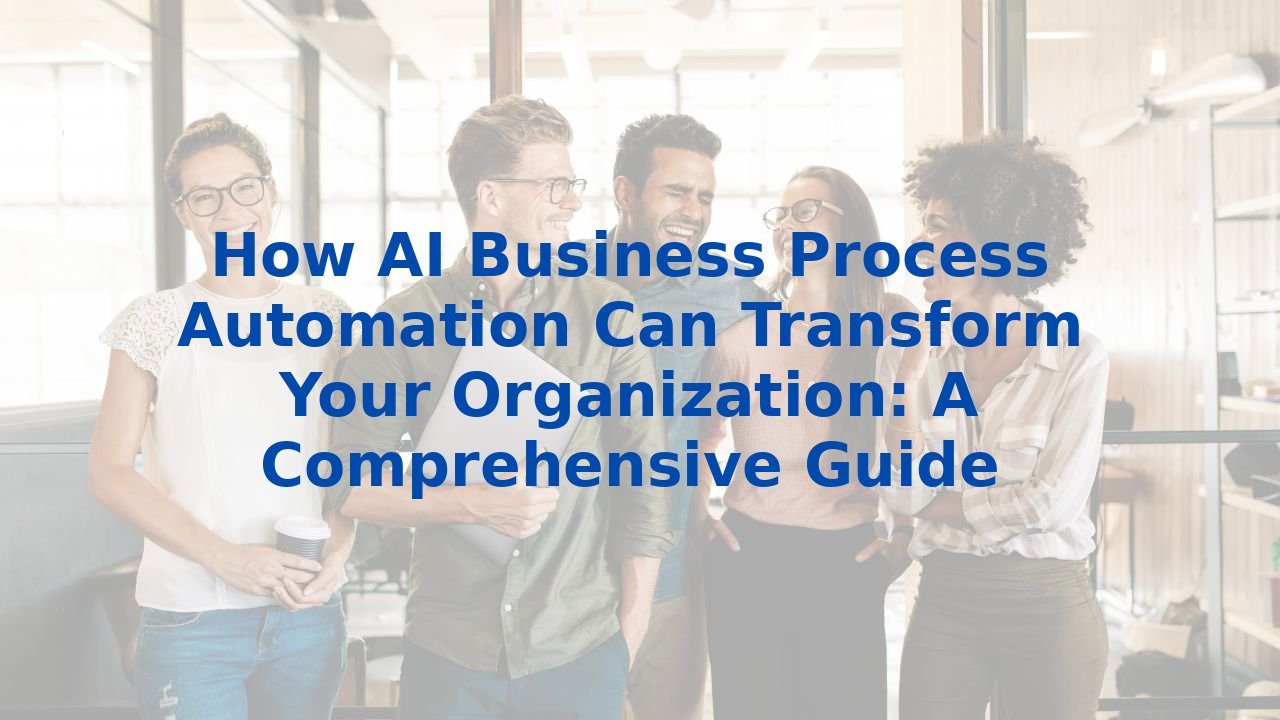How AI Business Process Automation Can Transform Your Organization: A Comprehensive Guide

How AI Business Process Automation Can Transform Your Organization: A Comprehensive Guide
In a world where competition is more fierce than ever, businesses are constantly searching for ways to enhance their efficiency and effectiveness. One groundbreaking solution that has emerged is AI business process automation. In this guide, we will explore how artificial intelligence is reshaping organizations, the core business processes it enhances, and the transformative benefits it offers.
The Benefits of AI Business Process Automation
At its essence, AI business process automation uses advanced algorithms and machine learning to streamline tasks that were traditionally manual and time-consuming. By implementing AI in their operations, organizations can achieve remarkable benefits, including:
1. Improved Efficiency and Productivity
Imagine a workforce where routine tasks happen instantly and without error. AI-driven automation can significantly enhance productivity by taking over repetitive tasks, allowing organizations to focus on the more strategic and innovative aspects of their operations. By prioritizing humans for tasks requiring critical thinking and creativity, companies can ensure a more engaged and fulfilled workforce.
2. Enhanced Decision-Making
When data is the lifeblood of modern business, the ability to analyze vast amounts quickly becomes a game-changer. AI systems can sift through vast datasets in real time, identifying patterns and trends that might otherwise go unnoticed. This informed approach enables organizations to make data-driven decisions that not only mitigate risks but also capitalize on emerging opportunities.
3. Cost Reduction and Resource Optimization
Cost efficiency isn’t just about cutting corners. AI automation optimizes resources by reallocating manpower and materials to projects that yield the highest return. By pushing for the automated handling of low-value tasks, companies can achieve significant operational cost savings. It’s about doing more with less—how profound is that?
4. Enhanced Customer Experience
In the digital age, customer expectations are higher than ever. AI-enhanced customer service can provide instant and accurate answers to inquiries, ensuring customer satisfaction around the clock. The combination of chatbots and virtual assistants allows businesses to stay connected with their customers, leading to a more personalized experience that fosters loyalty.
5. Streamlined and Optimized Processes
AI identifies inefficiencies within existing processes and recommends pathways to improvement. By automating complex workflows, organizations can ensure tasks are executed consistently and accurately, minimizing delays and errors. This streamlined approach to operations not only enhances efficiency but also elevates the overall quality of products and services delivered to customers.
AI Business Process Automation Across Industries
The different ways AI is transforming industries illustrates its versatility. Here are a few notable applications:
AI in Manufacturing
AI has the power to optimize production processes and manage supply chains more effectively. With real-time data analysis, AI can predict maintenance needs, thereby reducing downtime and maximizing operational efficiency. Additionally, inventory levels can be optimized, leading to reduced storage costs and waste.
AI in Customer Support
In customer support, AI doesn’t just speed up response times; it fundamentally alters how businesses interact with their clients. Chatbots can address common queries autonomously, freeing human agents to tackle more complex issues, amplifying satisfaction on both ends of the interaction.
Investing in Employee Training: The Unsung Hero of AI Success
While AI is groundbreaking, it’s essential to understand that its full potential can only be harnessed with well-trained employees. Here’s why investing in AI training is crucial:
- Adaptability: A workforce well-versed in AI technologies is more agile, quickly adjusting to the changes these new systems bring.
- Data Interpretation: Employees trained in data analytics can leverage insights from AI to make informed, strategic decisions.
- Process Optimization: With a keen understanding of AI capabilities, employees can identify the most impactful areas for implementation, ensuring optimal outcomes.
- Quality Customer Interaction: Trained employees can effectively communicate with AI systems, maintaining high service quality even with automation enhancements.
Conclusion
AI business process automation represents an extraordinary leap forward for organizations aiming to thrive in a highly competitive landscape. From enhancing efficiency and decision-making to improving customer interactions, AI has the power to revolutionize operational methodologies. However, to fully capitalize on these advancements, training and empowering employees to work alongside AI technologies are paramount. When integrated thoughtfully, AI not only reshapes workflows but also infuses a sense of purpose and clarity within teams—setting the stage for sustained success in the digital era.
For those ready to embark on this remarkable journey, exploring comprehensive AI training solutions can be the first step towards an empowered workforce capable of leveraging the full spectrum of AI’s potential.